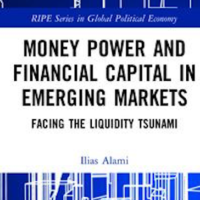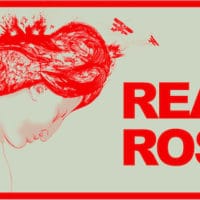-
Facing a liquidity tsunami? Profit, risk, and discipline in emerging markets
In April 2012, at the White House on her first visit to the United States since her election in 2010, Brazilian president Brazil Dilma Rousseff scolded advanced capitalist economies for unleashing a ‘tsunami de liquidez’, a ‘liquidity tsunami’, onto the developing world.
-
12 ways the U.S. invasion of Iraq lives on in infamy
While the world is consumed with the terrifying coronavirus pandemic, on March 19 the Trump administration will be marking the 17th anniversary of the U.S. invasion of Iraq by ramping up the conflict there.
-
Alone against the Virus
Decades of neoliberal austerity will make it harder to fight the COVID-19 pandemic. Now, more than ever, we must rebuild our social safety net and forge a New Deal for public health.
-
All too relevant: Marx’s critique of rights and neoliberal human rights
Jessica Whyte’s new book, The Morals of the Market, demonstrates the kind of scholarship we all aspire to: insightful, thought-provoking, and, above all, accessible and engaging. In it, she traces the “historical and conceptual relations between human rights and neoliberalism”.
-
Can the U.S. learn from China’s determined response to Coronavirus?
Red Lines host Anya Parampil provides a global Coronavirus update, explaining how China suppressed the pandemic with a determined and centralized strategy that was heavily criticized in the West.
-
Chris Hedges: Americans face a one-choice Election—The Oligarchy
Pulitzer-winning author and host of “On Contact” Chris Hedges joins Rick Sanchez to discuss the influence of lobbyists on establishment media in their coverage of politics and that donors, bankers and billionaires have on the U.S. political process.
-
Julian Assange must be supported
If the U.S. government succeeds in extraditing Julian Assange, it will be a major victory for U.S. imperialism–a promise that anyone getting in its way will ultimately pay the price.
-
The uses of “populism”
CLASS struggle occurs in the realm of concepts too. The World Bank for instance systematically counters Left concepts by employing a novel tactic: it uses the very same concepts as are used by the Left, but gives them a wholly different meaning; as a result they either come to mean something entirely different from what the Left had originally meant by them, or, at the very least, they become fuzzy and hence useless to the Left. In either case the power of the Left concept is neutralised.
-
Media malfunction as Sanders notes positive aspects of Latin American socialism
When 60 Minutes (2/24/20) asked Sen. Bernie Sanders about his past support for aspects of Cuba’s socialist revolution, as well as for Nicaragua’s 1979–90 leftist Sandinista government, Sanders responded by saying he opposes what he described as the “authoritarian” features of the Cuban government, while noting that after the 1959 revolution, Cuba launched “a massive literacy program. Is that a bad thing?”
-
Marx’s ‘Capital’ as a literary experience
Columbia University PhD candidate in English and Comparative Literature Tiana Reid finds that her students benefit from reading volume one of Karl Marx’s “Capital.” “There are so many literary wsys to read it, which I don’t think blunt the more radical political reading,” said Reid, who conducts research in Black Studies, Marxism and feminism.
-
Israel hits a brick wall
Elections are supposed to solve problems by reordering government, adopting new policies, and putting new people in control. But how many elections must Israel have before it realizes it can do none of those things because it’s caught in an intractable constitutional bind?
-
Re-enchanting the world: Silvia Federici on feminism and the politics of the commons
In her recent volume Re-enchanting the World: Feminism and the Politics of the Commons (PM Press, 2019), Silvia Federici fruitfully brings together feminist reflections with discussions of the commons as a possible way of overcoming capitalism.
-
“Absolute freedom of critique and discussion lies at the heart of the interests of the workers’ movement, and it must be pursued at all costs.”
On Rosa Luxemburg’s birthday, we present an extract from her 1906 essay “Critique in the Workers’ Movement,” available in English for the first time.
-
Johnstone brings her moral compass to our Dantesque world
It is one of the great personal accounts of the anguished decline of our uncivilization, both a riveting eye-witness account of many of the horrors and perfidies, and a primer for students of history and all those struggling to not only dismantle the beast, but to prepare us for what follows it.
-
Absolutely sickening—and scary’: Man unfurls Nazi flag at Bernie Sanders rally, heightening security concerns
“All people of conscience must condemn this anti-Semitism against the most visible Jewish politician in the country.”
-
Fear pervades Black politics, and makes us agents of our own oppression
Black youth see the truth, and will act on it, we are certain.
-
From fossil capitalism to energy democracy?
As the 21st Century’s second decade opens, the increasingly severe symptoms of climate change comprise a pivot in the struggle for hegemony, globally and within national formations. With the highest per capital carbon emissions among the G20 states, Canada is a climate laggard and, in some respects, a first-world petro-state (Nikiforuk 2010), organized as a regime of obstruction (the title of an edited collection to be published this May, Carroll 2020d).
-
We who were nothing and have become everything shall construct a new and better world
On 8 March 1917 (23 February by the old Julian calendar), a hundred women in the textile factories in Petrograd decided to go on strike; they went amongst the other factories and called their fellow workers onto the streets. Before long, around 200,000 workers–led by the women–marched through the streets.
-
Mariátegui: A South American revolutionary
Hardly anyone in Australia has heard of José Carlos Mariátegui. Yet in South America he holds an important place in revolutionary history.
-
Dossier no. 26: Frantz Fanon: The brightness of metal
Frantz Fanon was born on the Caribbean island of Martinique on 25 July 1925. He died in the United States, from leukaemia, on 6 December 1961. He was thirty-six years old.




















